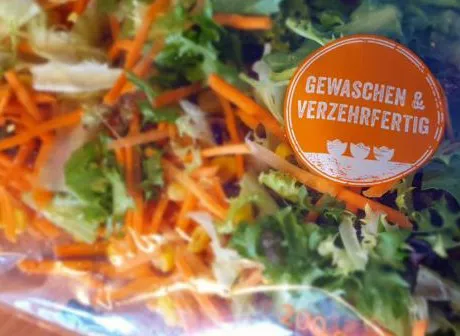Practical and delicious: Pre-cut lettuce (also known as "fresh cut") are often presented as a side dish during summer barbecues. But ready-to-eat salad mixes from the bag that were cut, washed and packed days before are among the most perishable foods.
Although refrigerated, there is a possibility that they spoil quickly. And there is a risk that they are contaminated with pathogenic germs such as Listeria, Salmonella, E. coli or viruses such as Noro or Hepatitis A. Blends of lettuce and raw vegetables such as white or red cabbage and carrots can thus be a danger of infection for humans. This is what the Verbraucherzentrale NRW points out in a press release.

Image: Verbraucherzentrale NRW
While intact salad and cabbage leaves offer some natural protection against germs, this protection disappears due to the cutting. At the cut surfaces, there will be juices which attracts germs. The prevailing humidity in the plastic packaging also provides an ideal climate to grow microorganisms quickly.
Washing is necessary
A consumer study carried out at the Rhein-Waal University of Applied Sciences in Kleve on the topic of barbecues in private households has shown that in every third of the households studied cut salads are not washed before consumption. Frequent references to the packaging, such as "prewashed" or "ready to eat", seem to mislead consumers into thinking that washing before consumption is not necessary.
Source: Verbraucherzentrale NRW
